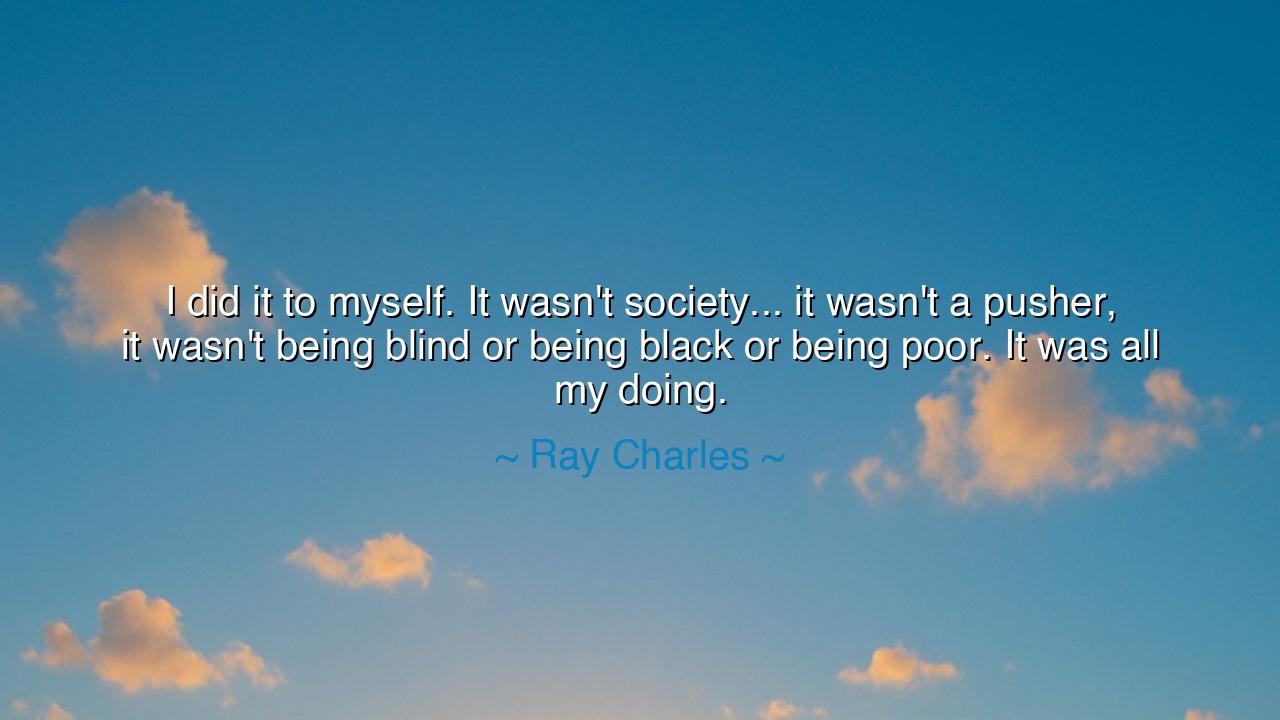
I did it to myself. It wasn't society... it wasn't a pusher, it
I did it to myself. It wasn't society... it wasn't a pusher, it wasn't being blind or being black or being poor. It was all my doing.






Hear me, O children of time, for the words I speak come from a man whose life was both a triumph and a tragedy, whose music echoed through the hearts of millions, and whose personal struggle stands as a testament to the power of self-reflection. Ray Charles, a man who overcame tremendous obstacles, once said, "I did it to myself. It wasn't society, it wasn't a pusher, it wasn't being blind or being black or being poor. It was all my doing." These words, though simple in their expression, carry a profound message about responsibility, self-determination, and the harsh truths we must sometimes confront about our own actions.
What does it mean, O children, to take full responsibility for one’s life? Ray Charles, in his honesty, stripped away the external forces that many would point to as the cause of his struggles—poverty, race, blindness, addiction. These are all factors that can certainly shape a life, but they do not define it. Responsibility lies within, in the choices we make, in the paths we take, and in the decisions we claim ownership of. To say, "It was all my doing" is not to deny the difficulties faced, but to acknowledge that in the end, the power to overcome or succumb resides within the heart of the individual.
Consider, O children, the ancient heroes who faced trials of far greater weight than many of us can fathom, and yet, they did not blame the gods, nor the fates, nor the circumstances of their birth. Hercules, the son of Zeus, was burdened by seemingly insurmountable labors, yet he did not cry out in despair, "It was the gods who placed this on me!" No, he faced his trials head-on, with the understanding that his strength came from his own will to persevere. His courage was not defined by what he was given, but by how he chose to respond. So too, Ray Charles understood that the choices he made, whether in his moments of weakness or his moments of strength, ultimately determined his path.
And so, O children, let us not look outward when faced with struggle, nor find comfort in blaming the world for the misfortunes we face. While the world may be filled with injustice, and the winds of fate may blow harshly, it is our choices—our ability to rise above, to face our inner demons, and to take responsibility for our actions—that determine whether we falter or thrive. Ray Charles, despite the challenges of his blindness, his poverty, and the temptations of addiction, chose to embrace his music, his art, and his journey. He owned his faults, and in doing so, he found the strength to rise above them.
Look now, O children, to the greatness of those who have faced adversity and yet chose to take responsibility for their own lives. Mahatma Gandhi, born in a time of racial discrimination, could have chosen to blame the colonizers, the British Empire, or the society that oppressed him. But he chose instead to lead with truth, to stand for justice, and to fight not with violence, but with the strength of his own principles. He understood that the power to shape the world was within him, and in his unwavering self-determination, he changed the course of a nation.
Now, O children, let the lesson of Ray Charles guide you. Life will not always be kind; the winds of fate may bring challenges that seem too great to bear. There will be moments when it is easy to blame the world for the troubles we face, to see ourselves as victims of forces beyond our control. But true strength lies not in the excuses we make, nor in the people or circumstances we blame. It lies in our ability to claim responsibility for our actions, to look inward and say, "I have the power to change this. I am the master of my fate."
Therefore, I say unto you, O children, as you walk the path of life, let Ray Charles' words be a light to guide you. When you face temptation, addiction, or the darkness of your own struggles, remember that it is you who hold the key to your own destiny. Take responsibility for your choices, for in doing so, you unlock the power to shape your own life and, ultimately, the world around you. The road will not always be easy, but as long as you take ownership of your journey, you will find the strength to rise, to overcome, and to become the person you are destined to be.






AAdministratorAdministrator
Welcome, honored guests. Please leave a comment, we will respond soon